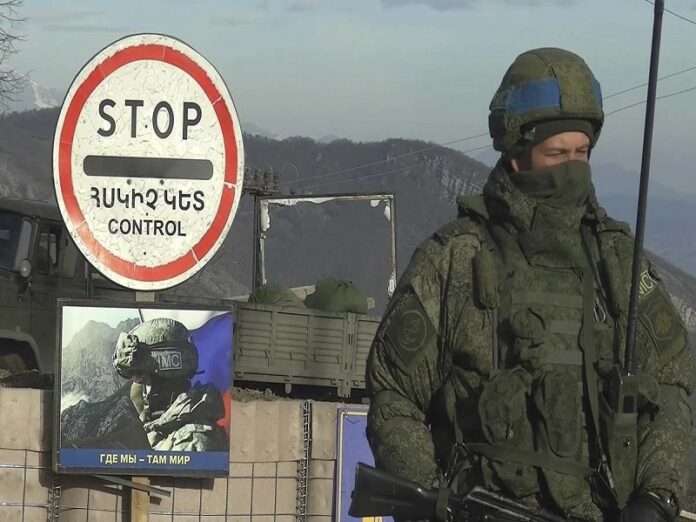It appears inevitable that Russian peacekeepers will soon depart from Azerbaijan’s Karabakh region following last month’s restoration of constitutional order over that previously separatist entity. They’re simply no longer needed after the swift end of that conflict and the subsequently voluntary departure of most Armenian Christians in the aftermath. Both outcomes are being spun by Russia’s opponents as a defeat, but that’s an inaccurate assessment for the reasons that’ll be explained in this piece.
For starters, Russian peacekeepers were solely tasked with monitoring the Moscow-mediated November 2020 ceasefire, the contents of which can be read in the preceding hyperlink that redirects to the Armenian Prime Minister’s official website. Although violations by both sides were recorded during this nearly three-year-long mission, the presence of these independent and mutually trusted forces deterred any major changes to the status quo until recently, which can be regarded as a success.
With respect to recent events, they were provoked by the terrorist attacks that the separatists and their Armenian state patron were fully responsible for. Russian peacekeepers weren’t tasked with carrying out intelligence-related activities aimed at detecting and stopping these plans in advance since such terms would have almost certainly resulted in Armenia refusing to agree to the ceasefire. If the fighting hadn’t stopped when it did, then the humanitarian consequences of the conflict would have been much worse.
It’s unclear why Armenia and its separatist proxies stepped up their terrorist attacks over the last few months. Even more curious is the fact that this happened after Pashinyan twice reaffirmed Azerbaijan’s sovereignty over Karabakh. Not only did these attacks discredit the role of Russian peacekeepers in some observers’ eyes, but they also obviously risked sparking a military reaction from Baku. It therefore appears as though Armenia might have actually wanted Azerbaijan to launch another offensive.
To elaborate, Armenia had been drifting westward since even before the 2020 conflict, but it began accelerating this trajectory to the point of a de facto pivot since the start of Russia’s special operation. The peacekeepers’ deployment made it impossible for Armenia to majorly rearm its separatist proxies in Karabakh, thus leading to the fait accompli of the region’s reintegration into Azerbaijan. Instead of responsibly facilitating this inevitability, Armenia wanted it to happen as dramatically as possible.
From Pashinyan’s self-interested perspective, his political career would be in jeopardy the moment that he made any tangible moves in the direction of aiding Karabakh’s reintegration into Azerbaijan. He also needed the most compelling pretext possible to speed up Armenia’s pro-Western anti-Russian pivot. These two imperatives combined to convince him that it’s best to provoke Baku into recommencing hostilities through the renewed terrorist campaign that began several months back.
Russia never expected such betrayal from Armenia, which risked opening up the West’s long-desired “second front” for taking military resources away from the special operation. That worst-case scenario was avoided because Russia’s CSTO mutual defense obligations to Armenia don’t extend into the separatist proxy state that the latter carved out of Azerbaijan. Accordingly, there was never any real risk of another Karabakh Conflict creating a “second front”, but it still served to manipulate perceptions.
The Western media immediately spun the false narrative that Russia “betrayed” Armenia, thus creating the pretext for Pashinyan to accelerate his country’s pivot. To add insult to injury, they and the Armenian diaspora lobby fearmongered about “ethnic cleansing” and “genocide”, which further smeared Russia’s reputation in the eyes of the world. In reality, neither of those two crimes occurred and all the Armenians that left Karabakh did so voluntarily after being scared by the diaspora’s fearmongering.
The large-scale exodus of Armenian Christians from majority-Muslim Azerbaijan is precisely what Pashinyan planned, however, since it would justify his aforementioned pro-Western anti-Russian pivot in parallel with giving the West its own faux “humanitarian” pretext to meddle in the region. France, where some of the world’s most ultra-nationalist Armenian diaspora reside, was the first to pounce on this geostrategic opportunity by declaring that it’ll soon send arms “to enable Armenia to defend itself.”
Absent the artificially manufactured “ethnic cleansing”, it might have been difficult to sell this move to the Western public, but now it’s much easier after nearly 500 European Parliamentarians condemned Azerbaijan for this imaginary crime in a recent resolution. Pashinyan’s self-interested political goals at home and the West’s geostrategic ones in the South Caucasus were therefore both advanced through these means, which had the added benefit of maximally smearing Russia in the process.
Returning to the impending departure of that country’s peacekeepers from Karabakh, they’re not to be blamed for the fast-moving sequence of events that unfolded since mid-September. Armenia betrayed Russia after its leader conspired with the West to provoke Azerbaijan into launching another offensive in reaction to the terrorist campaign that his country’s separatist proxies stepped up a few months back. One month ago, this would have been a conspiracy theory, but now it’s turned into a conspiracy fact.
Contrary to popular perceptions, neither Armenia nor any other CSTO country is a “Russian puppet”, which is why Moscow was unable to stop Pashinyan’s scheme. All that it could do was mitigate the geostrategic and humanitarian consequences by not getting dragged into a regional conflict and ensuring the protection of Karabakh’s Armenian Christians respectively. It succeeded with both, which is why its peacekeepers’ mission shouldn’t be spun as a defeat upon their impending departure.







